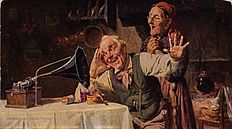Pleasure facts for kids
Pleasure is an emotion. It is the opposite of pain. Humans and many other mammals feel pleasure. People feel pleasure when they do something that is fun or that feels good.
Contents
Pleasure in neuroscience
Pleasure is studied in neuroscience. Neuroscientists have mapped pleasure "hotspots" in the brain. Pleasure is important for a person's mental health and well-being. The loss of pleasure is common in people with mental illnesses like depression, schizophrenia, and addiction.
Pleasure in psychology
Pleasure is studied in positive psychology. How much pleasure someone feels changes from person to person. Pleasure depends how special something is. There is no rule that says what pleasure is for every person.
Sigmund Freud wrote about the "pleasure principle" in the 1920 essay Beyond the Pleasure Principle. According to Freud, the pleasure principle is what drives people to do things that give them a feeling of immediate gratification.
Pleasure in philosophy
The ancient Greek philosopher Epicurus said that people feel the most pleasure possible when they have no suffering.
Hedonism is another philosophy that is focused on pleasure. It says that pleasure is good. In Hedonism, people focus on pleasure and avoid pain.
Utilitarianism is a philosophy that focuses on pleasure. It says that morality requires that people do what has the most utility for the most people.
Related pages
See also
 In Spanish: Placer para niños
In Spanish: Placer para niños


